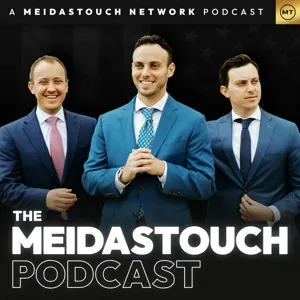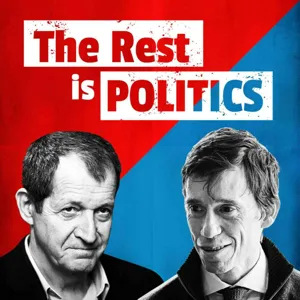Podcast Summary
Local elections in England and Burro Furniture discounts: England's local elections on May 4th will impact the political landscape, while Burro Furniture offers discounts on their outdoor collection for Mother's Day
This week, there are various opportunities for shopping and engaging with political discussions. Burro Furniture is offering discounts on their timeless outdoor collection, made with durable materials, at borough.com/acast. For Mother's Day, 1-800-Flowers invites you to celebrate moms with discounts on handmade bouquets, sweet treats, gourmet food, and unique gifts at 1800flowers.com/acast. In politics, the local elections in England on May 4th will test the political landscape, with over 8,000 council seats up for grabs, particularly in urban and traditional battlegrounds. Ben Walker, The New Statesman's elections expert, will discuss what to look out for in England's local elections on their politics podcast. Keep an eye on these events for potential changes in the political and shopping landscapes.
Local elections: Unpredictable and influenced by local issues and voter turnout: Labour leads in local elections, but local issues, voter turnout, Brexit impact, and voter ID implementation can cause dramatic swings. Conservatives may benefit slightly due to lower turnout and less awareness. Insights into political climate and voter demographics will be crucial.
Local elections can be unpredictable and significantly different from national polls. Labour currently holds a lead of 15 to 20 points, but local issues and voter turnout can cause dramatic swings. The Conservative Party tends to benefit slightly more in council elections due to lower voter turnout and less awareness of local elections. Another trend to watch is the impact of Brexit on Labour's voter base, particularly in areas with a high Leave voting coalition. Labour's performance in these areas, such as Blackpool and Burnley, will be crucial in determining their overall success in the elections. Additionally, the implementation of voter ID may impact turnout and could potentially favor the Conservative Party. Overall, the local elections will provide valuable insights into the current political climate and the effectiveness of each party in appealing to various voter demographics.
Local elections as a preview of the 2023 general election: The local elections in 2023 will provide insight into which parties are gaining momentum and which areas will be crucial in the upcoming general election.
The 2023 general election will likely be shaped by the outcomes of the local elections in certain key areas. The Labour Party aims to regain seats in places like Swindon, Milton Keynes, Stevenage, Rugby, Filton and Bradley Stoke, and Kingswood in South Gloucestershire. The Liberal Democrats, coming from a strong 2019 performance, are expected to hold on to their gains in Surrey, Oxfordshire, and Hertfordshire, and make additional gains in Tiverton and Honiton. The impact of independents and incumbency effects in Teesside and the north east will also be significant factors to watch. The narrative that emerges from these local elections will set the tone for the general election, as it is likely to be the last electoral test before the main event.
Local elections in the UK: Exciting Contests Ahead: The Tories, Lib Dems, Reform UK, Greens and others are gearing up for significant campaigns in the UK local elections, with the Tories holding strong local infrastructure, Lib Dems focusing on wealthier regions, and Reform UK, Greens making strides in new areas.
The local elections in the UK are shaping up to be an exciting and dynamic contest, with various parties, including the Tories, Lib Dems, Reform UK, and Greens, gearing up for significant campaigns. The Tories have strong local infrastructure and counselors in place, particularly in the northeast and other areas. The Lib Dems are focusing on wealthier regions like Manchester and Oxfordshire, aiming to make significant gains. Reform UK and the Brexit party are also preparing for big campaigns, and the Greens are expected to make significant strides, particularly in areas where they have previously had little presence, such as mid Suffolk. The elections offer an opportunity to reflect on the political landscape of four years ago and the impact of parties like the Brexit party and Reform UK, which did not fully show their strength in the 2019 local elections. The local elections will provide valuable insights into the political mood of the country and the potential for shifts in power at the local level.
Local elections as a test for political parties: Local elections allow parties to define narratives, manage expectations, and engage supporters. The Greens saw local success, while the Conservatives faced criticism but improved turnout. Labour aims to demonstrate local competence and present an alternative to the Conservatives.
Local elections serve as a significant test for political parties and their leaders, particularly those focused on winning elections like the Conservative Party. These elections allow parties to define their narratives, manage expectations, and engage their supporters. In the recent local elections, the Green Party saw local success but joined the national scene, leading to a more defined voter base. The Conservatives, led by Rishi Sunak, faced criticism and low polling earlier in the year, making these elections a potential threat to his leadership. However, Sunak's grip on the party has tightened, and the focus on local issues like crime and sewage has helped improve turnout among Conservative supporters. For Labour and Keir Starmer, these elections offer an opportunity to demonstrate their ability to address local concerns and present a viable alternative to the Conservatives. Overall, local elections serve as a crucial indicator of public sentiment and the political landscape, shaping the narrative and strategies for the parties moving forward.
Understanding Local Elections: Local elections are important indicators of the political landscape, but interpreting the results requires considering nuances and complexities, such as varying numbers of voters and seats, to gain accurate insights.
The local elections are an important indicator of the political landscape, but interpreting the results can be complex. The parties place significant importance on these elections as a sign of their likelihood to form the next government. However, the number of voters and seats up for election vary greatly between different areas, making direct comparison to a national election difficult. Extrapolating results to the national picture can provide some insight, but it's essential to consider the nuances and complexities of the local elections. In the past, overlooked trends in local elections, such as the UKIP surge in 2014, have had significant implications for the outcome of general elections. Therefore, it's crucial to pay close attention to every seat and not just focus on the national equivalent vote. The media coverage of local elections can also be misleading, as the varying numbers of voters and seats make direct comparison difficult. Overall, while local elections provide valuable insights, interpreting the results requires a nuanced understanding of the complexities involved.
Labour's success in regaining seats from Lib Dems doesn't guarantee progress in crucial constituencies: Examine ward-by-ward results to assess Labour's gains against Conservatives, not just headlines, and be aware of SNP's challenges in Scotland
The Labour Party's success in regaining seats from the Liberal Democrats in certain areas during the May elections does not necessarily indicate progress in the crucial marginal constituencies that will determine their path back to government. Instead, it's essential to examine the ward-by-ward results, especially in areas like Swindon and Milton Keynes, to assess if Labour is making gains against the Conservatives. The media coverage may oversimplify the situation, so it's crucial to look beyond the headlines for a more accurate understanding. Additionally, in Scotland, the Scottish National Party (SNP) is facing a hectic time with two major figures, including Nicola Sturgeon's husband, being arrested this month. These developments add another layer of complexity to the political landscape.
Scottish National Party in Turmoil over Alleged Donor Fund Misuse: Key SNP figures arrested over misuse of donor funds, uncertainty surrounds First Minister Nicola Sturgeon's involvement, disbelief and disheartment among party members, reputations of Sturgeon and husband at stake, impact on party support uncertain.
The Scottish political scene is in turmoil following the arrests of key figures in the Scottish National Party (SMP), including Peter Murrow and Colin Beatty, over allegations of misuse of donor funds. The potential involvement of First Minister Nicola Sturgeon in the investigation has added to the shock and uncertainty within the party. The mood among SNP figures is one of disbelief and disheartment, with some questioning the leadership of new SNP leader Humza Yousaf and the party's prospects in upcoming elections. The scandal has raised serious concerns about the reputations of Sturgeon and her husband, who have dominated Scottish politics for years, and the potential impact on the party's support. The coming weeks and months will provide more clarity on the extent of the damage to the SNP and the political landscape in Scotland.
Scottish National Party (SNP) facing uncertainty with new leadership and investigations: The SNP could face pressure to change leadership if they underperform in the next election and believe they made a mistake with Humza Yousaf. The party's long tenure in power and recent controversies may lead to a shift in behavior and openness to change.
The political landscape in Scotland, specifically within the Scottish National Party (SNP), is experiencing uncertainty following the recent leadership race and the ongoing police investigations involving the outgoing administration. Kate Forbes, who came close to winning the leadership race, is now in a strong position as she is not directly connected to the current administration and its controversies. The SNP, which has historically been loyal to its leaders, may face pressure to change leadership if they perform poorly in the next general election and believe they made the wrong choice with Humza Yousaf. The party's long tenure in power and recent investigations could potentially lead to a shift in their behavior and openness to change. However, it's too early to predict the exact outcome and the SNP may still give Yousaf time to lead before considering a change.
SNP Leadership Challenges Overshadow Humza Yousaf's Speech: SNP faces financial questions and leadership investigations, overshadowing Humza Yousaf's focus on the well-being economy and business relationship change.
The Scottish National Party (SNP) leadership of Humza Yousaf has faced significant challenges, including the delay of policies like the bottle return scheme and the controversial approach to national care assistance. The speech he gave to the Scottish Parliament, which was intended as a reset, was overshadowed by the police investigation into his predecessor, Nicola Sturgeon, and the financial questions surrounding the SNP. Yousaf's focus on the well-being economy and changing the relationship with business lacked clarity on how it would be achieved, and his lack of public popularity and the close leadership election have left him with little room to address concerns. The SNP's handling of these issues may have been anticipated given the questions about their finances, but the extent and timing of these challenges have overshadowed Yousaf's leadership.
Nicola Sturgeon's Resignation Raises Questions: Recent events have left listeners questioning the information available during Nicola Sturgeon's resignation speech and its potential impact on decisions made.
The resignation speech of Nicola Sturgeon raised questions about what was known at the time and its potential impact on decisions made. Anoushia Kalyan, a podcast host on The New Statesman, expressed her disappointment towards Sturgeon's resignation as she held a high regard for her integrity. However, recent events have left her questioning the information available then and its implications. Listeners are encouraged to attend a live podcast edition at the Cambridge Literary Festival and submit questions for discussion. Additionally, UnitedHealthcare Insurance Plans offer flexible and budget-friendly medical, dental, and vision coverage. In other news, 1800 Flowers provides a wide range of gifts for various occasions, ensuring every step of the process is made with love and care.





